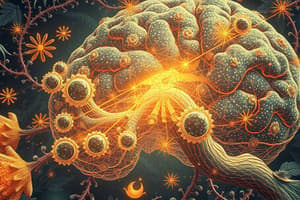Podcast
Questions and Answers
What determines if a person will feel positive or negative emotions according to the text?
What determines if a person will feel positive or negative emotions according to the text?
- Their physiological reactions
- The routine nature of the events
- The type of situation they are in (correct)
- Their subjective experience
What does a reward smile signal?
What does a reward smile signal?
- Anger
- Sadness
- Positive intentions (correct)
- Contempt
What contributes to a greater emotional impact on a person according to the text?
What contributes to a greater emotional impact on a person according to the text?
- Unexpected events (correct)
- Routine events
- Physiological reactions
- Idiosyncratic interpretations
How are people likely to react to reward smiles?
How are people likely to react to reward smiles?
How can emotions change according to the text?
How can emotions change according to the text?
What is the effect of seeing standard facial poses on people?
What is the effect of seeing standard facial poses on people?
What is emphasized as the basis of emotions in the text?
What is emphasized as the basis of emotions in the text?
Which type of smile can be associated with wanting to show higher social or moral status?
Which type of smile can be associated with wanting to show higher social or moral status?
Emotions can have a subjective sense of what else besides pleasure or distress?
Emotions can have a subjective sense of what else besides pleasure or distress?
How do people typically react when they see standard facial poses of emotion?
How do people typically react when they see standard facial poses of emotion?
What is the exception to the sense of wanting to do things?
What is the exception to the sense of wanting to do things?
Which statement best describes the link between behaviours and the state of action readiness?
Which statement best describes the link between behaviours and the state of action readiness?
How does the social context affect behavior according to the text?
How does the social context affect behavior according to the text?
What aspect of emotional episodes/events is highlighted in the text?
What aspect of emotional episodes/events is highlighted in the text?
How does representation of an emotion episode/event in memory differ from other memories?
How does representation of an emotion episode/event in memory differ from other memories?
What are the components of emotional intelligence discussed in the text?
What are the components of emotional intelligence discussed in the text?
What is affect intensity according to the text?
What is affect intensity according to the text?
Which personality characteristics are most correlated with emotions according to the text?
Which personality characteristics are most correlated with emotions according to the text?
What distinguishes individualistic cultures from collectivistic cultures regarding emotions?
What distinguishes individualistic cultures from collectivistic cultures regarding emotions?
How does affect intensity differ from affective lability?
How does affect intensity differ from affective lability?
Emotional intelligence refers to the ability to label emotions accurately and have a complex understanding of one's emotions.
Emotional intelligence refers to the ability to label emotions accurately and have a complex understanding of one's emotions.
Affect intensity is the tendency to experience intense emotions constantly without any specific triggers.
Affect intensity is the tendency to experience intense emotions constantly without any specific triggers.
Neuroticism is more associated with consistent positive affect like happiness and enthusiasm.
Neuroticism is more associated with consistent positive affect like happiness and enthusiasm.
In individualistic cultures, people report feeling more guilt and less happiness compared to collectivistic cultures.
In individualistic cultures, people report feeling more guilt and less happiness compared to collectivistic cultures.
Emotions are described as within people in collectivistic cultures and between people in individualistic cultures.
Emotions are described as within people in collectivistic cultures and between people in individualistic cultures.
Flashcards are hidden until you start studying
Study Notes
Emotions and Reactions
- Emotions are a type of reaction a person has to a situation, considered relevant to their needs, goals, or values.
- Positive emotions occur when events satisfy or promise to satisfy goals, needs, or values, while negative emotions occur when events harm or threaten them.
- Emotions have a greater impact when events change the current situation, especially if they are unexpected.
Subjective Experience
- Emotions involve a sense of pleasure or pain/distress, accompanied by physiological reactions (e.g., heart pounding).
- Emotions also involve a sense of wanting to take action, with some exceptions like sadness.
- Facial expressions and body movements are tied to the emotional state and action readiness.
Physiology and Behaviour
- Emotions are linked to underlying autonomic and hormonal systems, but there is no consistent pattern of underlying physiology for different emotions.
- Behaviour resulting from an emotional reaction depends on the mental state and social context of the person.
- Embodied emotional episodes are stored in memory, including the motor behaviour that occurred during the emotional event.
Embodiment and Memory
- Memories of emotional events include the motor behaviour that occurred during the event.
- Recall of an emotional event can prime motor behaviour, and motor behaviour can prime emotional reactions.
- If people cannot experience emotions in their bodies, it can interfere with their subjective emotional experience.
Emotional Experience
- People feel emotions when the situation is meaningful to them, which leads to physiological reactions and a subjective sense of wanting to take action.
- Emotional events involve behaviour and are embodied in memory.
- There is no one-size-fits-all approach to emotional experiences, and people may show emotion in their behaviour without being aware of it.
Studying That Suits You
Use AI to generate personalized quizzes and flashcards to suit your learning preferences.





